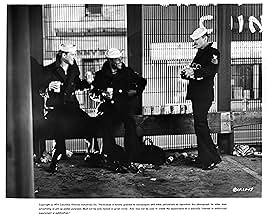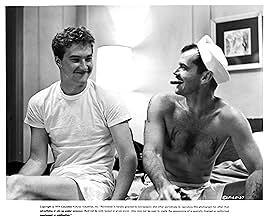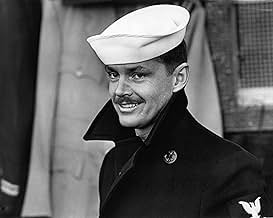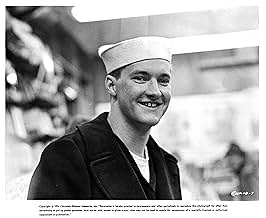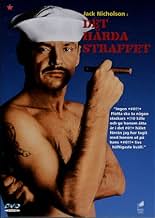VALUTAZIONE IMDb
7,5/10
30.342
LA TUA VALUTAZIONE
A due uomini della Marina viene ordinato di portare in prigione un giovane delinquente, ma decidono di mostrargli un ultimo buon momento lungo la strada.A due uomini della Marina viene ordinato di portare in prigione un giovane delinquente, ma decidono di mostrargli un ultimo buon momento lungo la strada.A due uomini della Marina viene ordinato di portare in prigione un giovane delinquente, ma decidono di mostrargli un ultimo buon momento lungo la strada.
- Candidato a 3 Oscar
- 6 vittorie e 9 candidature totali
Patricia Hamilton
- Madame
- (as Pat Hamilton)
Recensioni in evidenza
I read somebody's comment that this film isn't "deep." I think that viewer missed a whole layer of the story. you have to keep in mind that this was written and produced during the vietnam war and released during the early months of Watergate.
The story is about these two working class sailors, who are completely disenfranchised, just "doing their job." They're good guys but in the end, don't lift a finger to stop a massive injustice. They don't even take the time to think about it, because they feel there's nothing they can do about it. They pay lip services to how wrong things are about the situation, but in the end they do what "the man" says and they're just as much to blame for the problem as the commanding officers above them.
Through the course of the film, the sailors meet a lot of "chatting class" folks who are mad at Nixon and discussing politics, and they meet Hari Krishnas who are chanting to change things, but nobody is really taking any ACTION. Everyone is pissed off at the injustice of the world but nobody does anything about it. It's about inaction. And that inaction slowly boils up in the main characters and turns into anger that brings the film to a sad end. (It's one of those great stories that gets you pissed off at the injustice in the world...)
Having said all that, on a more tangible level, the performances and scripting are full of emotion and Nicholson's and Quaid's performance are amazing and hilarious to watch. But this isn't really a comedy in the end...more tragic really (with some good laughs along the way).
Check it out!
The story is about these two working class sailors, who are completely disenfranchised, just "doing their job." They're good guys but in the end, don't lift a finger to stop a massive injustice. They don't even take the time to think about it, because they feel there's nothing they can do about it. They pay lip services to how wrong things are about the situation, but in the end they do what "the man" says and they're just as much to blame for the problem as the commanding officers above them.
Through the course of the film, the sailors meet a lot of "chatting class" folks who are mad at Nixon and discussing politics, and they meet Hari Krishnas who are chanting to change things, but nobody is really taking any ACTION. Everyone is pissed off at the injustice of the world but nobody does anything about it. It's about inaction. And that inaction slowly boils up in the main characters and turns into anger that brings the film to a sad end. (It's one of those great stories that gets you pissed off at the injustice in the world...)
Having said all that, on a more tangible level, the performances and scripting are full of emotion and Nicholson's and Quaid's performance are amazing and hilarious to watch. But this isn't really a comedy in the end...more tragic really (with some good laughs along the way).
Check it out!
If you respond to this film, you will probably go all the way and love it as much as I do. It is probably the high point of the drama of social realism started back by the like of "Marty."
It is Nicholson's film, yet Quaid and Otis Young(in his only good movie) really shine as well. It is the most heartbreaking of material played without sap or sentiment. Obscenity like this was still pretty new to movies back in 73, be sure to avoid edited T.V. versions. Reading the comments, it is sad that todays movie fans, spoonfed sledgehammer crappola, really can't respond to a drama played with the kind of subtle grace of "The Last Detail." Give it a shot. Ten out of ten.
It is Nicholson's film, yet Quaid and Otis Young(in his only good movie) really shine as well. It is the most heartbreaking of material played without sap or sentiment. Obscenity like this was still pretty new to movies back in 73, be sure to avoid edited T.V. versions. Reading the comments, it is sad that todays movie fans, spoonfed sledgehammer crappola, really can't respond to a drama played with the kind of subtle grace of "The Last Detail." Give it a shot. Ten out of ten.
Though the film's storyline diverges from the more existential theme of the Darryl Ponicsan novel from which it was adapted, 'The Last Detail' was, is, and remains the only real deal film about navy enlisted men. Hollywood never did sailors so well as it does them here.
If you don't care for testosterone-impelled behavior, parochial esprit de corps, scatology, and profanity - well, never mind: the dialogue here is true-to-life sailorese, and the hi- and low-jinks antics are too. If you can't take the heat, get the hell out of the galley.
Gritty cinematography of the earthy, low-rent world of enlisted sailors (for example, watching the "decent peoples' world" pass by the filth-streaked windows of a worn, smelly railway car) communicates much of the characters' experience of life in the margins and their ethos and how they came by them. The Johnny Mandel score is often oddly, and too-cheerfully irrelevant, though one suspects its breezy take on nautical marches and ditties was meant to be satirical; but it's often discordant with the serious themes - 'the individual versus society', existential choice and haplessness - of 'The Last Detail'.
In a role that could have been tailor-made for him Jack Nicholson's acting is perhaps the best of his career - a superior foreshadowing of his later turn in 'One Flew Over the Cuckoo's Nest'. But without Otis Young as his fellow seasoned petty officer and Randy Quaid as the naive young, brig-bound seaman, Nicholson's tour de force would have fallen as flat as a flathat (for all you landlubbers: the navy blue "Donald Duck" US NAVY-ribbon bound winter sailors' hats, which sailors hated intensely, that were abolished in the early 60's).
Politically correct left-leaning folks should discover in Gunners Mate 1st Class "Mule" Mulhall a perfect example of an African American professional sailor: serious yet fun-loving; jocular but no-nonsense; competent and quietly self-assured: in short, a sailor among sailors, a man among men. I know because I served, and when the chips were up or down no sailor cared about color, and each of us cared only that he or she could rely, or not, on our shipmates. Though it has its arcane rules, written and unwritten, the naval service is remarkably egalitarian in opportunity - and it is so without all the hue and cry of civilian "social consciousness".
Though it's a marvel of a film, 'The Last Detail' could not cram into its running time all the humor and pathos of the eponymous, tough-tender Ponicsan novel (in which petty officer Mulhall's character looms quite a bit larger than he does in the movie, and Billy Buddusky's reflexive resorting to signalling with his Signalman's semaphoring hands spells out apt clues to his worldview); and the novel (which, incidentally, I read while on active duty, before the film had been made) turns out with a dramatically different ending - with a true denouement absent from the screenplay's conclusion that left me wanting, and which is the film's only grave, if quibbling, flaw. But the screenplay incorporates characters, scenes (Carol Kane as the careworn young whore providing Quaid's Seaman Meadows his first experience of coupling), and dialogue that might also have helped the novel to better flesh out and plumb the characters and their experience. Small matter, really: the book and the film contrast and complement each other perfectly.
Anyone considering enlistment should see 'The Last Detail' because it tells enlisted sailors' life like it is. If you can take life like it is, with or without the occasional fix ('An Officer and a Gentleman' anyone?) of kitschy, unrealizable romantic fantasy, then 'The Last Detail' is your meat.
The Real Deal. Chow Call, Chow Call - All hands lay to the messdeck! Take all you want - Eat all you take. Down to 'The Last Detail'.
If you don't care for testosterone-impelled behavior, parochial esprit de corps, scatology, and profanity - well, never mind: the dialogue here is true-to-life sailorese, and the hi- and low-jinks antics are too. If you can't take the heat, get the hell out of the galley.
Gritty cinematography of the earthy, low-rent world of enlisted sailors (for example, watching the "decent peoples' world" pass by the filth-streaked windows of a worn, smelly railway car) communicates much of the characters' experience of life in the margins and their ethos and how they came by them. The Johnny Mandel score is often oddly, and too-cheerfully irrelevant, though one suspects its breezy take on nautical marches and ditties was meant to be satirical; but it's often discordant with the serious themes - 'the individual versus society', existential choice and haplessness - of 'The Last Detail'.
In a role that could have been tailor-made for him Jack Nicholson's acting is perhaps the best of his career - a superior foreshadowing of his later turn in 'One Flew Over the Cuckoo's Nest'. But without Otis Young as his fellow seasoned petty officer and Randy Quaid as the naive young, brig-bound seaman, Nicholson's tour de force would have fallen as flat as a flathat (for all you landlubbers: the navy blue "Donald Duck" US NAVY-ribbon bound winter sailors' hats, which sailors hated intensely, that were abolished in the early 60's).
Politically correct left-leaning folks should discover in Gunners Mate 1st Class "Mule" Mulhall a perfect example of an African American professional sailor: serious yet fun-loving; jocular but no-nonsense; competent and quietly self-assured: in short, a sailor among sailors, a man among men. I know because I served, and when the chips were up or down no sailor cared about color, and each of us cared only that he or she could rely, or not, on our shipmates. Though it has its arcane rules, written and unwritten, the naval service is remarkably egalitarian in opportunity - and it is so without all the hue and cry of civilian "social consciousness".
Though it's a marvel of a film, 'The Last Detail' could not cram into its running time all the humor and pathos of the eponymous, tough-tender Ponicsan novel (in which petty officer Mulhall's character looms quite a bit larger than he does in the movie, and Billy Buddusky's reflexive resorting to signalling with his Signalman's semaphoring hands spells out apt clues to his worldview); and the novel (which, incidentally, I read while on active duty, before the film had been made) turns out with a dramatically different ending - with a true denouement absent from the screenplay's conclusion that left me wanting, and which is the film's only grave, if quibbling, flaw. But the screenplay incorporates characters, scenes (Carol Kane as the careworn young whore providing Quaid's Seaman Meadows his first experience of coupling), and dialogue that might also have helped the novel to better flesh out and plumb the characters and their experience. Small matter, really: the book and the film contrast and complement each other perfectly.
Anyone considering enlistment should see 'The Last Detail' because it tells enlisted sailors' life like it is. If you can take life like it is, with or without the occasional fix ('An Officer and a Gentleman' anyone?) of kitschy, unrealizable romantic fantasy, then 'The Last Detail' is your meat.
The Real Deal. Chow Call, Chow Call - All hands lay to the messdeck! Take all you want - Eat all you take. Down to 'The Last Detail'.
My absolutely favorite Jack Nicholson film has always and forever will be The Last Detail. I don't think he was ever better on the screen as William Baddusky of the United States Navy. I enjoyed his performance and the film itself on so many levels. Probably not surprising since the script was done by Robert Towne who would soon be teaming with Nicholson again for the critical and popular success Chinatown.
It's a simple story, not really any plot to the film. Two sailors, Jack Nicholson and Otis Young, both of them lifers in the Navy are stationed in Norfolk and get themselves an assignment to escort a prisoner to the Naval Stockade at Portsmouth. Of course with the per diem allowance for the two men and the prisoner and five days to travel in, Nicholson and Young are thinking of a mini-spree at government expense.
It comes to that and a lot more. the prisoner is newcomer Randy Quaid whose big crime is that he attempted to steal $40.00 from a charity collection box. For that he's getting eight years in military prison and a dishonorable discharge. A dishonorable discharge even today is not a good thing for one's resume.
As Nicholson and Young both remark, someone really stuck it to him. Let's face it what Quaid did in civilian life would probably be considered petty larceny and his jail time might be measured in days. Turned out it was the base commander's wife's favorite charity so it got stuck to him good. Sad because the indications we get is that Quaid was a troubled kid in civilian life and probably military service offered him a chance to straighten up and fly right.
It's done that for many others including Nicholson and Young who make it very clear even on this disagreeable detail they do like the Navy and like serving in it.
They've got five days to deliver Quaid to Portsmouth so the journey becomes quite the odyssey for the three of them up the Atlantic coast. The three men have a great chemistry between them, you get involved with their lives and really feel for young Quaid and his plight. Quaid gets shown a good time and maybe that's not such a good thing considering what he is facing.
The Last Detail is a nice realistic look at the military both its flaws and good points. A lot of similarity here in the issues raised to From Here to Eternity and if I mention The Last Detail in the same sentence favorably as From Here to Eternity, you know how good it must be.
It's a simple story, not really any plot to the film. Two sailors, Jack Nicholson and Otis Young, both of them lifers in the Navy are stationed in Norfolk and get themselves an assignment to escort a prisoner to the Naval Stockade at Portsmouth. Of course with the per diem allowance for the two men and the prisoner and five days to travel in, Nicholson and Young are thinking of a mini-spree at government expense.
It comes to that and a lot more. the prisoner is newcomer Randy Quaid whose big crime is that he attempted to steal $40.00 from a charity collection box. For that he's getting eight years in military prison and a dishonorable discharge. A dishonorable discharge even today is not a good thing for one's resume.
As Nicholson and Young both remark, someone really stuck it to him. Let's face it what Quaid did in civilian life would probably be considered petty larceny and his jail time might be measured in days. Turned out it was the base commander's wife's favorite charity so it got stuck to him good. Sad because the indications we get is that Quaid was a troubled kid in civilian life and probably military service offered him a chance to straighten up and fly right.
It's done that for many others including Nicholson and Young who make it very clear even on this disagreeable detail they do like the Navy and like serving in it.
They've got five days to deliver Quaid to Portsmouth so the journey becomes quite the odyssey for the three of them up the Atlantic coast. The three men have a great chemistry between them, you get involved with their lives and really feel for young Quaid and his plight. Quaid gets shown a good time and maybe that's not such a good thing considering what he is facing.
The Last Detail is a nice realistic look at the military both its flaws and good points. A lot of similarity here in the issues raised to From Here to Eternity and if I mention The Last Detail in the same sentence favorably as From Here to Eternity, you know how good it must be.
Often regarded as a comedy-drama, 'The Last Detail' always stood out to me as a pure drama. It tells the story involving a group of Navy officers: a young and meek officer (Randy Quaid) steals some money but gets caught; the two others (Jack Nicholson and Otis Young) are to take him to prison. They (especially Nicholson) get somewhat attached to the boy when they see how young (ie.: don't know much of the world) and weak he is and decide to show him how to be a man before putting him away.
A look at the cast/crew shows how promising the film is. Hal Ashby is a fine director, whose films I always like/love (except maybe for 'Coming Home', which often gets too preachy and melodramatic); the screenplay is done by Robert Towne, the same guy who would later do 'Chinatown'; and the leading actor is Jack Nicholson, one of cinema's greatest actors.
Speaking of Jack Nicholson, he is just brilliant here. His character, 'Bad-Ass' Buddusky, is the type of character he is at best with: sarcastic and irreverent even when serious, yet very smart and caring in his own way. He acts as a father figure for the young Meadows (Quaid), trying to lift his mood and have him something to remember and be happy before having to face the harsh conditions of prison. Quaid and Young, alongside the supporting characters, end up overshadowed by Nicholson's performance, but they too make a great work with their characters.
As typical of a 70's and/or Hal Ashby film, 'The Last Detail' has great photography and is strangely comfortable to look at. The movie is very realistic too, with both situations and characters being very believable and sympathetic. The characters are very fleshed out and developed, making it difficult not to like or remain indifferent towards them. I've also heard that the way Navy/Marine officers are portrayed are also very close to the real thing, without forcing their portrayal as a way of criticism of the armed forces, which many directors would jump at the chance to do (specially considering the time this movie was made). In truth, I didn't feel that the film was a critique of the military like many say.
My only complaint on the movie is that it's supposed to be a comedy too. Yes, there are awkward situations and Jack Nicholson's typical rebellious way of dealing with everything; but the movie tends to make them more interesting than actually funny. Not that I'm saying this is bad; 'The Last Detail' is a remarkable movie in every aspect and one of the best pure dramas I've seen.
A look at the cast/crew shows how promising the film is. Hal Ashby is a fine director, whose films I always like/love (except maybe for 'Coming Home', which often gets too preachy and melodramatic); the screenplay is done by Robert Towne, the same guy who would later do 'Chinatown'; and the leading actor is Jack Nicholson, one of cinema's greatest actors.
Speaking of Jack Nicholson, he is just brilliant here. His character, 'Bad-Ass' Buddusky, is the type of character he is at best with: sarcastic and irreverent even when serious, yet very smart and caring in his own way. He acts as a father figure for the young Meadows (Quaid), trying to lift his mood and have him something to remember and be happy before having to face the harsh conditions of prison. Quaid and Young, alongside the supporting characters, end up overshadowed by Nicholson's performance, but they too make a great work with their characters.
As typical of a 70's and/or Hal Ashby film, 'The Last Detail' has great photography and is strangely comfortable to look at. The movie is very realistic too, with both situations and characters being very believable and sympathetic. The characters are very fleshed out and developed, making it difficult not to like or remain indifferent towards them. I've also heard that the way Navy/Marine officers are portrayed are also very close to the real thing, without forcing their portrayal as a way of criticism of the armed forces, which many directors would jump at the chance to do (specially considering the time this movie was made). In truth, I didn't feel that the film was a critique of the military like many say.
My only complaint on the movie is that it's supposed to be a comedy too. Yes, there are awkward situations and Jack Nicholson's typical rebellious way of dealing with everything; but the movie tends to make them more interesting than actually funny. Not that I'm saying this is bad; 'The Last Detail' is a remarkable movie in every aspect and one of the best pure dramas I've seen.
Lo sapevi?
- QuizThe script was completed in 1970 but contained too much profanity to be shot as written. Columbia Pictures waited for two years trying to get writer Robert Towne to tone down the language. Instead, by 1972, the standards for foul language relaxed so much that all the profanity was left in.
- BlooperThe MAA Master Chief is not wearing a Master-at-Arms rating badge; he is wearing a Boatswain mate rating badge.
The Master At Arms rating was disestablished in 1921, but was officially re-established on 1 August 1973. Therefore, as the story takes place, a Master Chief Boatswain's Mate being assigned the collateral duty of MAA is entirely accurate.
- Colonne sonoreNever Let The Left Hand Know
by Jack Goga
I più visti
Accedi per valutare e creare un elenco di titoli salvati per ottenere consigli personalizzati
- How long is The Last Detail?Powered by Alexa
Dettagli
- Data di uscita
- Paese di origine
- Siti ufficiali
- Lingua
- Celebre anche come
- L'ultima corvée
- Luoghi delle riprese
- Aziende produttrici
- Vedi altri crediti dell’azienda su IMDbPro
Botteghino
- Budget
- 2.300.000 USD (previsto)
Contribuisci a questa pagina
Suggerisci una modifica o aggiungi i contenuti mancanti



